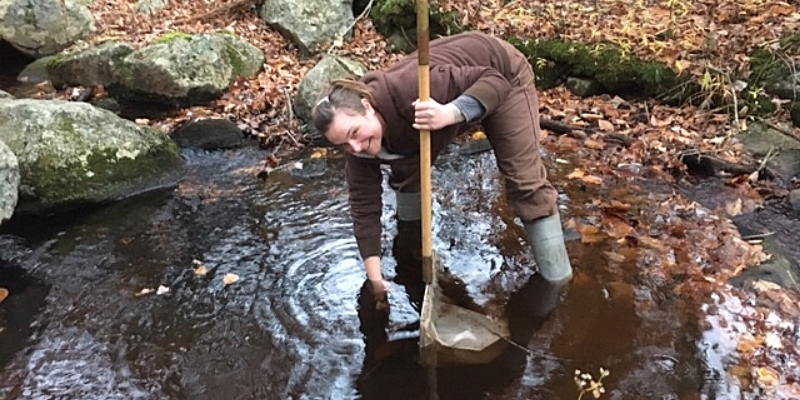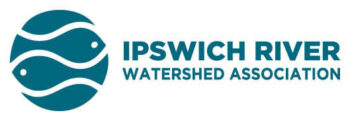
Volunteer monitor, Claire Hilsinger, sampling macroinvertebrates at Walker Creek in Gloucester. Macroinvertebrates are good indicators of water quality and are especially vulnerable to low flows and droughts.
Lows flows and droughts are a problem for the Ipswich River most summers. Living things will thrive in healthy rivers; not only fish, but the many small creatures that live among the rocks and logs submerged beneath the surface. Many of these are macroinvertebrates which include certain types of insects, crayfish, snails, freshwater mussels and similar creatures that are visible to the naked eye. These are a vital part of the food web of a river and should be abundant. We are fortunate to work with many volunteers on an annual basis to collect and identify specimens for the macroinvertebrate monitoring program. This is important to show the impacts of low flows and droughts on such a vital part of life in the Ipswich River.
Macroinvertebrate monitoring takes place each fall by sampling shallow riffle areas. Riffle areas are shallow, rocky zones of a river or stream where the rocks not only provide good hiding places, but water flowing over the rocks creates a stirring action creating a critical source of oxygen for fish and other aquatic organisms. As riffles are shallow, they are often the first parts of a river to dry up and unlike fish, macroinvertebrates cannot move away and seek refuge in pools. Once this happens, the macroinvertebrate community may not fully recover, even when flows return.
Sampling results from 2016, when the last drought occurred, showed this effect. The abundance of macroinvertebrates had declined greatly at many sites compared to the previous years. Sampling over the following years showed a gradual increase in abundance, especially at locations and in streams surrounded with more forested land, which tend to improve water and habitat quality. The river is experiencing low flows again this summer, threatening the recovery of macroinvertebrates.
We plan to continue the Macroinvertebrate Monitoring program in the fall and will be seeking volunteers. An outdoor training event will be held at one of the sites after which we will coordinate with volunteers to borrow the sampling equipment and go to other monitoring sites across the region. Interested individuals should visit the fill out the volunteer inquiry form here and indicate your interest in this program.
